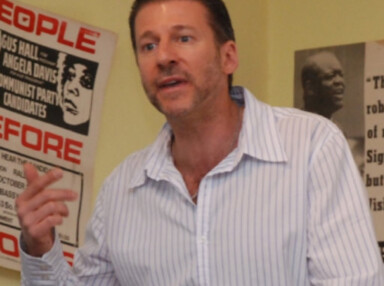Radmila Nakarada
Distinguished Fellow

location
Belgrade, Serbia
radmila.nakarada@fpn.bg.ac.rs.
projects
Sociologist, born in Belgrade, worked as a researcher at the Economic Institute and the Institute for European Studies and from 2001 to 2019 was a professor of Peace Studies at the Faculty of Political Science, University of Belgrade. At the FPS she in fact introduced this field and set up for the first time at a state University an undergraduate and graduate program in Peace Studies. Until her retirement she taught Courses at the BA, MA and PhD level and co-coordinated a new Regional MA program in Peace Studies, held in English. In addition she was the founder and director of the Center for Peace Studies at the same Faculty. At the Faculty of Political Sciences from 2012-2015 she was the Head of the Department for International Studies. From 2016-2019 she headed the PhD studies at the same Department. Her work has been highly evaluated by her students particularly in the realm of conflict analyses.
She has been involved in a number of research projects, domestic and foreign, devoted primarily to global challenges, violent breakup of Yugoslavia, transition and reconciliation. Over the years she has lectured in the region (currently she is a visiting professor at the University of Donja Gorica, Dep. of Humanistic Studies, Montenegro) as well in the US (University of Buffalo, Rutgers University), UK (UCL, School of Slavonic and East European Studies), Japan (visiting professor at the International Christian University, ICU, 2001) and Sweden (University of Lund 1988). During her career she was active in a number of international associations, among others the International Sociological Association (ISA), International Peace Research Association (IPRA), World Futures Studies Federation (WFSF) Transnational foundation for peace and future research (TFF). As a researcher she has worked in a number of projects, financed by foreign foundations, and institutions, World Orders Model Project (WOMP, USA), Swiss Institute of Federalism, Swiss Scientific Foundation, German Berghof, ZND. She has been a member of editorial/advisory boards of national (Viewpoints, Sociological Review, editor in chief 2013-2015, FPS Almanac), and international journals (Millennium, Journal of Balkan and Near Eastern Studies.)
She was a member of the Yugoslav Truth and Reconciliation Committee (2001) and its first spoke-person.
During her collaboration with WOMP, the organization received the 1990 UNESCO Peace Prize. She herself is the recipient of the award Third Way (2014), given by the Serbian Victimology society for contributing to a non-conflictual and holistic approach to studies of war and war crimes.
She has published articles, chapters in collections, and books both in Serbian and English.
Publications
- Nakarada, Radmila, Vidojevic, Jelena, “Basic Analytical Assumptions of Empowering the Periphery: the telling experiences of South Africa and Republic of Serbia”, Political Perspectives, University of Zagreb, Vol. 13, No. 2, 2023, pp. 33-56.
- Biljana Vankovska, Radmila Nakarada, “The Left Critique of the European Union: A View from the Balkan Periphery”, Security Dialogues, Ss. Cyril and Methodius University in Skopje, vol. 11, no. 1, 2020, pp.69-83.
- The Post-pandemic World: the (Im)possibility of productive change, Security Dialogues, Ss. Cyril and Methodius University in Skopje, Vol. 12, No. 2, 2021, pp. 7- 16.
- Nakarada, Radmila, Vidojevic Jelena, (eds.), Nobel Peace Prize, Between Idealism and Political Cynicism, FPS, Belgrade, 2018. (Author of chapter: Nobel Peace Prize, Between Idealism and Political Cynicism, pp. 19-58).
- Nakarada Radmila, Vesna Knezevic, Aleksandar Milosevic (eds.) The Great War – the Unfinished Past, FPS, Belgrade, FPS, 2016. (Author of chapter: Living in Parallel Realities –Serbia in 1914 and 2014, pp. 51-68)
- Nakarada, Radmila, Volic, Jelena, Preconditions for regional reconciliation, in: Politics of building peace in the region: Burdens from the past and visions for the future, Sarajevo, Forum ZFD,FPS, 2018 pp. 66-78.
- Tepsic Goran, Nakarada Radmila Dzuverovic Nemanja, (eds.) Interpretations of Yugoslav conflicts and their consequences: between fundamental discord and dialogue, Belgrade, Forum ZFD, FPS, Center for Peace Studies, 2016 (Author of chapter: Introduction: On the Problems of Interpreting the Disintegration of SFRY, pp.17-22).
- Tepsic Goran, Nakarada Radmila, Mirjana Vasovic, Ethnic Stereotypes and National Myths as an Obstacle to Reconciliation in Serbian-Albanian Relations, Belgrade, FPS, Center for Peace Studies, Berghof foundation, Belgrade, 2015 (Author of chapter: The main controversies in the historical narratives of Serbs and Kosovo Albanians, pp.21-66).
- From Yugoslavia to the western Balkans, in: Jean-Pierre Cabestan, Aleksandar Pavkovic (eds.), Secessionism and Separatism in Europe and Asia, London, Routledge 2013, pp.66-81.
- The disintegration of Yugoslavia, problems of interpretation, confronting truth and transition, Belgrade, Sluzbeni glasnik, 2008.
- Globalization and Transition, in: Laslo Sekelj, Jovan Teokarevic (eds.) Transition a Decade Later: Lessons and Prospects, Belgrade, IES, 2004, pp.192-216.
- Slobodan Samardzic, Nakarada Radmila, Djuro Kovacevic (eds.) Labyrinth of Crisis, Preconditions for a Democratic Transformation of SR Yugoslavia, Belgrade, IES, 1998. (Author of chapter: Global Framework for Democratic Transformation, pp. 33-54).
- The Post Bipolar World: the North/South Antinomies, the report from Zimbabwe, Belgrade, World Order Models Project, WOMP and Institute for European Studies, 1995.




